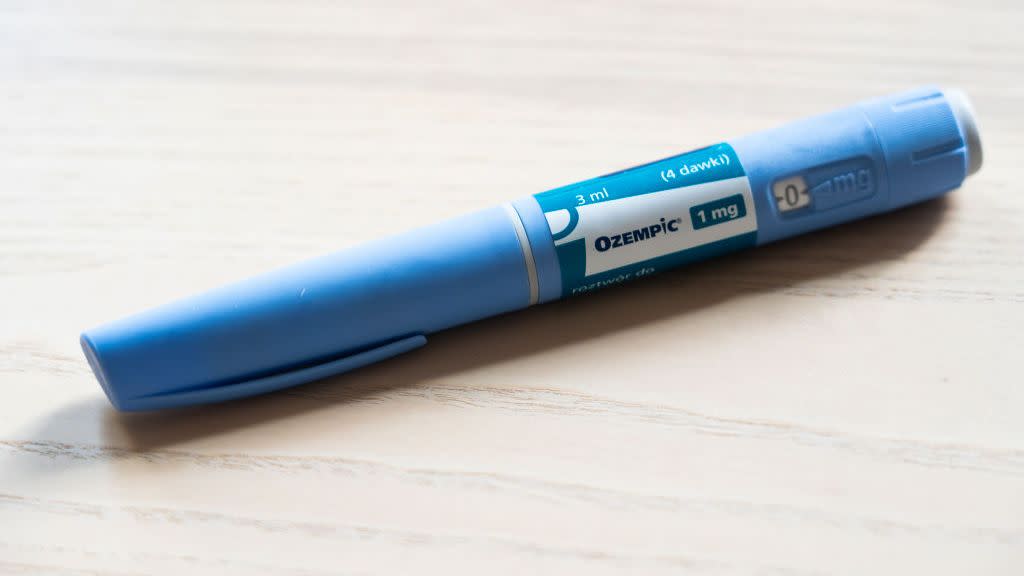5 Foods to Avoid When Taking Ozempic, According to Experts

"Hearst Magazines and Yahoo may earn commission or revenue on some items through these links."
[table-of-contents] stripped
The buzz surrounding type 2 diabetes drug Ozempic, and its main active ingredient semaglutide (which also serves as the main active ingredient in weight loss drug Wegovy) continues to grow, though it’s not without its side effects. Patients may report nausea and gastric discomfort, leading experts to suggest Ozempic foods to avoid while taking the medication (and other drugs containing semaglutide) to lessen any discomfort they may experience.
Many who take this class of medication, known as glucagon-like peptide 1 agonists (GLP-1), feel the pros outweigh the cons. The drug has been known to aid in weight loss and bolster heart and kidney health. However, some of the less glamorous Ozempic side effects reported include Ozempic face and Ozempic butt, while the drug’s manufacturer warns that nausea, constipation, and an upset stomach may occur. One way to help mitigate these experiences is by tweaking your diet.
Meet the experts: Maria Teresa Anton, M.D., endocrinologist and educator at Pritikin Longevity Center; and Priya Jaisinghani, M.D., endocrinologist at NYU Langone Health.
Ahead, experts share Ozempic foods to avoid, what to eat when taking Ozempic, and more.
Ozempic foods to avoid
While there are no foods that are off-limits for those taking Ozempic (or any other semaglutide-containing drug), there are some that experts recommend avoiding or limiting as they may exacerbate certain side effects. Dr. Anton and Priya Jaisinghani, M.D., endocrinologist at NYU Langone Health, say you may want to limit or avoid:
Greasy foods
Fatty foods
Spicy foods
Large meals
High-carbohydrate meals (for those with type 2 diabetes)
“These all may worsen the known gastrointestinal side effects of Ozempic, including nausea, bloating, diarrhea, or constipation,” explains Dr. Anton. “If my patient is on Ozempic for the treatment of diabetes, I also advise patients to avoid high-carbohydrate meals in order to prevent elevations in blood glucose.”
Why might someone avoid certain foods when taking Ozempic?
It all comes down to the mechanism behind the drug. “Ozempic causes a delay in gastric emptying, which may produce uncomfortable symptoms such as bloating, nausea, diarrhea, or constipation,” explains Dr. Anton. “Maintaining a balanced diet, adequate hydration, and frequent small meals will help to prevent these complications. Your healthcare provider may advise against certain foods in order to prevent these complications based on your individual response and tolerance of the medication.”
Dr. Jaisinghani says that the way Ozempic works, in delaying gastric emptying, “may give rise to side effects.” So, she says, one approach “involves counseling patients on minimizing the intake of specific food categories to alleviate potential gastrointestinal discomfort.” She says this may also help with heartburn.
What doctors want you to know before taking Ozempic
Every patient is unique, but there are some foods professionals advise against eating when prescribing the type 2 diabetes drug. “I warn patients who are starting on Ozempic or any medications in this class to decrease alcohol consumption as there is a small but present increased risk of pancreatitis while on these medications,” Dr. Anton says. “Excess alcohol intake is a well-known risk factor for the development of pancreatitis, which can be a life-threatening condition.”
What are the best foods to eat when taking Ozempic?
While taking Ozempic it is imperative to prioritize eating lean protein, fruits, and vegetables along with adequate fiber and fluid intake, Dr. Jaisinghani says. “The rationale behind this dietary emphasis lies in its contribution to a well-balanced nutritional approach, which necessitates close supervision by healthcare professionals, including physicians and registered dietitians, to address individualized nutritional requirements,” she says.
Dr. Anton also emphasizes the importance of protein intake and hydration. “Accelerated weight loss can lead not only to rapid fat loss but also to lean muscle loss. In order to prevent the loss of valuable lean muscle mass, we encourage our patients to increase protein intake, along with starting a strength training routine,” says Dr. Anton. “I recommend that my patients increase their consumption of plant-based and lean animal proteins while on the medication.”
You Might Also Like
